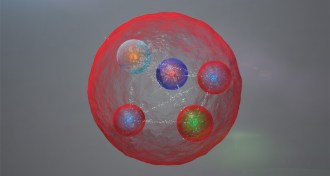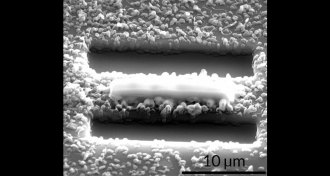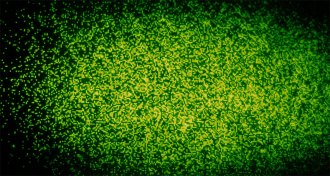Physics
Sign up for our newsletter
We summarize the week's scientific breakthroughs every Thursday.
-
 Quantum Physics
Quantum PhysicsYear in review: Quantum spookiness is real
A new version of an experiment proposed in 1964 confirmed a counterintuitive tenet of quantum mechanics.
By Andrew Grant -
 Physics
PhysicsYear in review: Big stride for superconductivity
Compelling but not quite confirmed research in 2015 suggested that hydrogen sulfide is a superconductor at temperatures as high as 203 kelvins.
By Andrew Grant -
 Particle Physics
Particle PhysicsYear in review: Collider creates pentaquarks
Two particles discovered in 2015 are each composed of five quarks.
By Andrew Grant -
 Cosmology
CosmologyDebate grows over whether X-rays are a sign of dark matter
The dwarf galaxy Draco, which is chock-full of dark matter, doesn’t emit a band of X-rays that researchers hoped were produced by the mysterious invisible stuff.
By Andrew Grant -
 Quantum Physics
Quantum PhysicsGoogle’s quantum computer speeds up, but practical use is unclear
Google’s D-Wave quantum computer is getting faster, but it’s still unclear whether it will ever outperform regular computers at completing useful tasks.
By Andrew Grant -
 Chemistry
ChemistryElusive chemical reaction transition state captured
A new method provides a detailed look at the elusive transition state.
-
 Physics
PhysicsThere’s no hiding from new camera
A new camera tracks objects hidden around a corner by detecting light echoes, similar to the way bats use sound to find prey.
By Andrew Grant -
 Chemistry
Chemistry‘Q-carbon’ may offer quick route to diamonds
Q-carbon might be the third form of solid carbon, but some scientists have doubts.
By Meghan Rosen -

-
 Quantum Physics
Quantum PhysicsSpooky quantum connection quantified for multiple particles
Physicists have measured quantum entanglement between several particles rather than just two.
By Andrew Grant -
 Physics
PhysicsMaxwell’s demon faces the heat
A device inspired by an 1867 thought experiment fails to break the second law of thermodynamics, which governs the flow of heat and the drive toward maximum disorder.
By Andrew Grant -
 Physics
PhysicsFinal chapter published in decades-long Gravity Probe B project
It took more than 50 years, but an experiment testing general relativity has finally come to a close.
By Andrew Grant